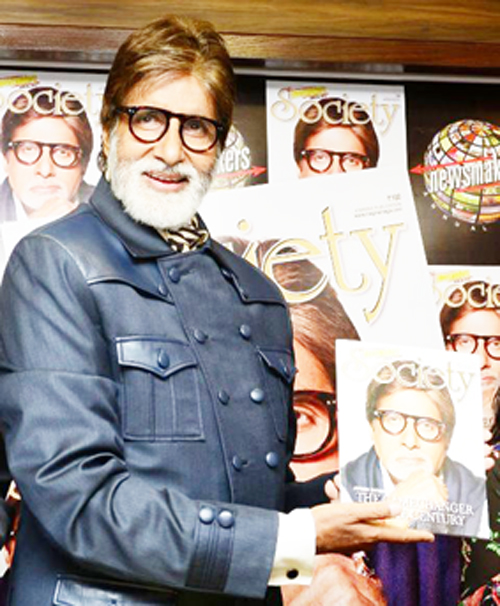He is 1 to 10 of Hindi cinema. Even at 70, he has the charisma that makes him the coverboy of leading magazines. He is Amitabh Bachchan. Sreya Basu in
conversation with the timeless superstarin Mumbai on his wishes
to be a journalist and impact of cinema in society
You must have given thousands of interviews in the last few decades. How often have you gone into introspection before answering a questionaire?
I thinkif there is an occasion given to someone to do an interview and the questions are appropriate, one likes to delve deep into some of the aspects of the questions that have been asked. And I feel very happy when I do that. I did that recently for Society (magazine) that featured me on its cover as ‘The Game Changer of the Century’.
Now that you mentioned it, how does it feel to be called ‘The Game Changer of the Century’?
It’s wrong … totally.
What do you think about the changing format of journalism in the country now?
Well, the modern concept is that everything is now moving away from the printed form and moving towards the electronic or net formats. I do feel that ever since the internet has come, it has become faster, more communicative … people get to know news even before perhaps journalists do. But I still feel that there is room and there is great value in holding up a magazine or newspaper and going through it, rather than something that comes to your laptop or computer.
Do you read news online or in the papers?
Honestly speaking, my own habit of reading newspapers early in the morning has kind of diminished. I get the news, say by midnight, on the internet. But then, there is still the desire to get the paper in the morning.
You once said on your blog that you would want to be a journalist in your next birth. Why is that?
Because I prefer to sit on the side you are now. (Laughs). See, there are so many things that come to your mind in respect to the society and many times I wish to voice my opinion on them. But there is always a fear of being miscommunicated or being misinterpreted so that I am made the accused. I felt, no one questions journalists. So I just want the opportunity of not being asked any question, and rather be asking questions.
People keep accusing films for increasing violence and crimes in the society. What’s your opinion on that?
Films were invented in the 20th century. So do they mean there was no crime or violence before the 20th century? There were violence and crimes. I think it’s not right to keep accusing the film industry for these things. If people feel a particular thing shown in films is not right for the society, then we are ready to change it. The government has constituted a censor board and we abide by what it says, what the laws of the country say. Some people even take their objection to the court; then the case gets heard as well.
You keep posting photos from the sets of your latest film Satyagraha on Facebook. Tell us more about the film.
I don’t know if PrakashJha (director) would like me to talk about the film now. But as you know what satyagrahameans, it is peaceful revolt, a path shown by (Mahatma) Gandhiji … if one want to bring a change in the society or country, how one can revolt, the film is based on that.
Of 100 years of cinema, you have been a part of it for almost 44 years.
I am proud of this Indian film industry. During the initial years, films were not given importance. People used to think all associated with films are wrong persons. All children from ‘good families’ were stopped from watching films. Why others, even things very same for me. During my childhood, if I were to go to watch a film, my parents (HarivanshraiBachchan and TejiBachchan) used to watch it first. Then after evaluation, I was permitted to go and watch the film. From that era, see where we are now! What was kind of a negative point for the society, now has become a parallel culture of the country. I feel proud that I am a small part of this industry. And I am very happy the way it is progressing. Not just India, even other countries are celebrating the 100 years of Indian cinema. (TWF)


